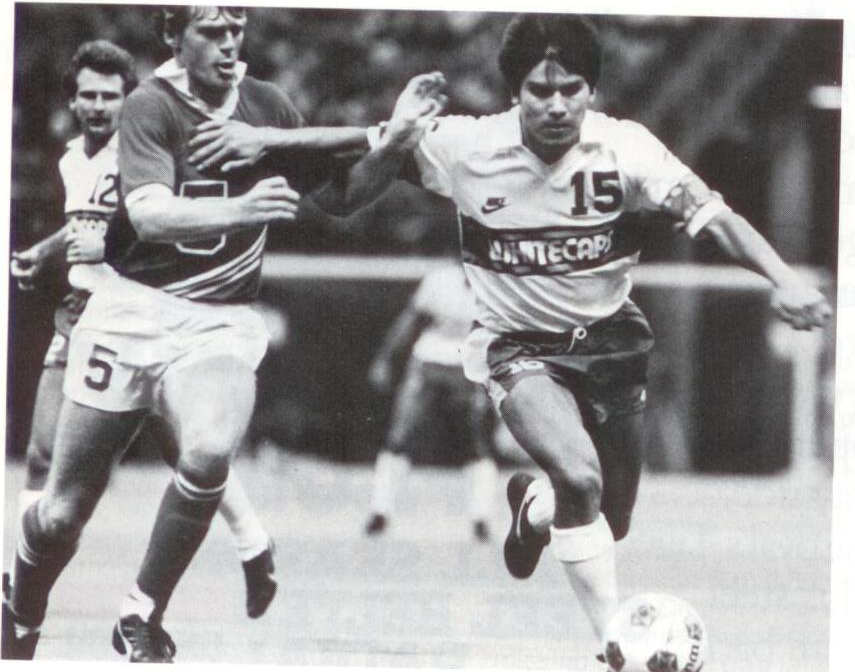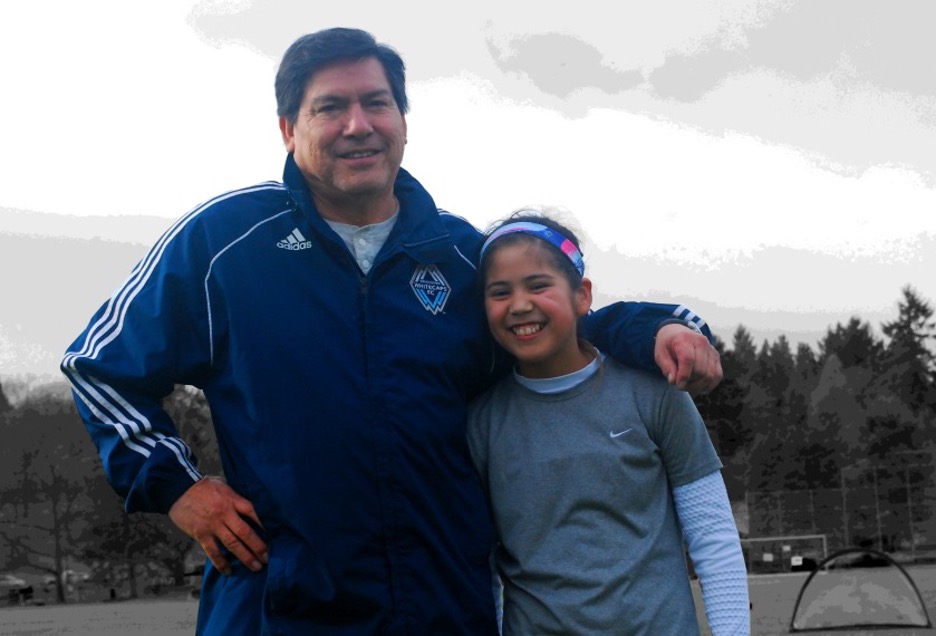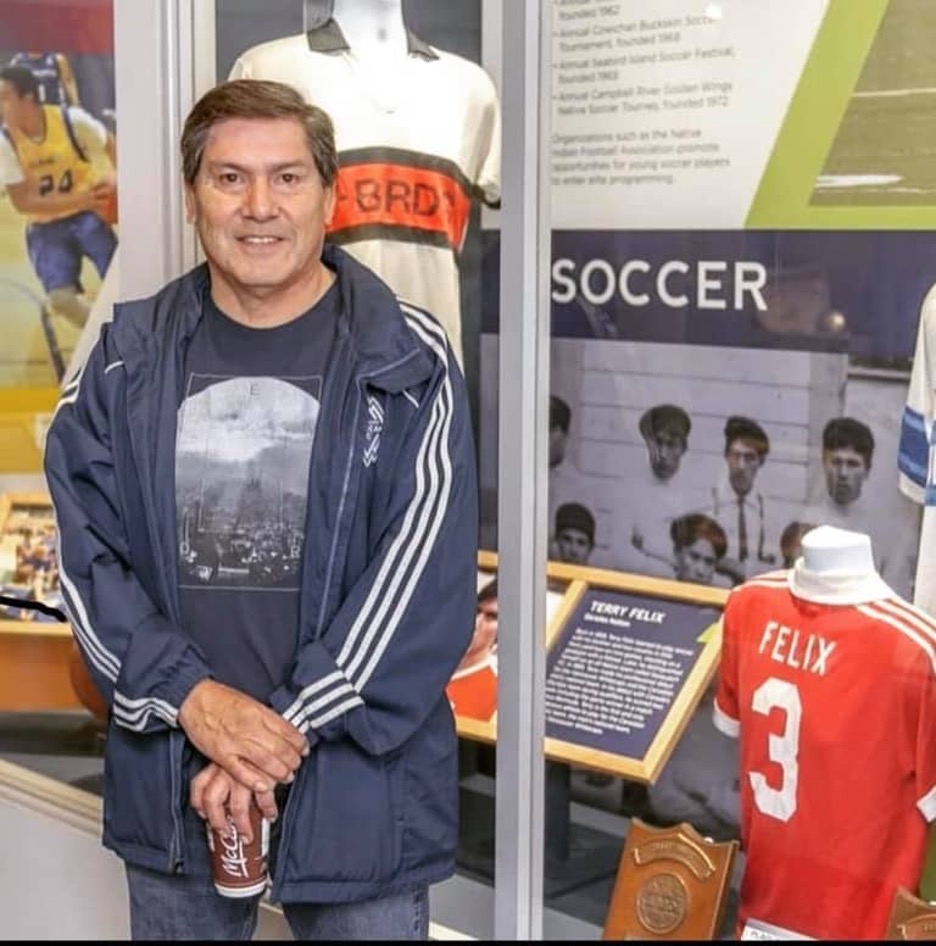
- Details
- By Ben Pryor
Major League Soccer (MLS) returns for its 28th season later this month. Today, the league has strong connections to the Indigenous community, celebrating its history in Canada and the United States and honoring the league’s all-time goal scorer Chris Wondolowski, a member of the Kiowa Tribe.
All of these ties are due, in part, to the barriers broken down by Terry Felix (Sts’ailes First Nation).
Felix made history in 1983 as the first Indigenous professional soccer player in North America and the first to represent the Canadian national soccer team. He earned that title on July 10 of that year when his team, the Vancouver Whitecaps, faced off against the New York Cosmos in North American Soccer League (NASL). The NASL was the precursor to today’s MLS.
The day before the first game, the head coach told Felix to prepare himself because he might play the game for a few minutes.
“The next day, I went to the stadium – and it was packed,” Felix told Native News Online. “And before the game, Coach Giles came to me and said, ‘You're starting now.’ And I said, ‘Oh God, I don't want to start.’”
Vancouver’s British Columbia Place Stadium was at capacity at 50,205 to see the top two teams in the league. The second-placed New York Cosmos was a fan favorite and former club of the soccer great, Pelé.
“Then I started getting nervous and shaking,” Felix expressed. “I didn’t want to play as I was just really nervous. But I had to settle down and get ready for the game. It was pretty neat.”
Felix went on to have a superb game, assisting on the goal and nearly scoring in the second half. The Whitecaps went on to beat the Cosmos 2-0.
Felix’s rise was meteoric, but ended quickly.
He started for the MLS Whitecaps, the Canadian National Team, and the Canadian Olympic Team. After the Whitecaps season ended in 1983, he was with the Canadian National Team in Victoria, training to play Mexico in an Olympic Qualifier.
The unthinkable happened just before a routine training session, and his life’s trajectory twisted in a flash.
“I (was) running down the field and stepped into a silver dollar-sized hole,” Felix said. “And it tore a ligament in my knee. And the coach said, ‘You tore a ligament, you have to go home.’ So, I phoned my wife. And I said, ‘I got hurt. I’m coming home.’”
His wife also had news.
“She said, ‘I’m pregnant.’ I got home, and we were sitting around the apartment the next day, and Whitecaps called me,” Felix recalled. “And I thought, ‘They’re going to renew my contract.’ I went in, and they said, ‘Well, we found out you got hurt, and we’re releasing you from the contract.’”
Within close to 36 hours, Felix went from playing with three of the top teams in North America to being injured, having no club and a new baby on the way.
His daughter was due to be born during the 1984 Olympics. He had to decide whether to stay away for two months with the national team at the Olympics or stay home and help care for his daughter.
“I decided that soccer was over,” Felix said. “I stayed behind and phoned the national team and said I wouldn’t go.”
At 24, Felix was forced to make a significant commitment.
“That was a hell of a decision,” Felix said.
His judgment exemplified what was most important to him: his family and community.
 Terry and his granddaughter Scarlett in Vancouver in 2016. (Photo Credit: Peter Mothe) (Photo: Terry Felix) Nowadays, Felix’s bond with his family and community is stronger than ever. He lives a few hours east of Vancouver, on the Chehalis Indian Reserve where he grew up, and works at a minimum security prison in Agassiz.
Terry and his granddaughter Scarlett in Vancouver in 2016. (Photo Credit: Peter Mothe) (Photo: Terry Felix) Nowadays, Felix’s bond with his family and community is stronger than ever. He lives a few hours east of Vancouver, on the Chehalis Indian Reserve where he grew up, and works at a minimum security prison in Agassiz.
Felix helps reintroduce prisoners to society again, some of whom have been incarcerated for four decades or more.
“Three days a week, I take them out of prison,” Felix explained. “These guys are ready to get back into the community, and they’re eligible for parole. You start thinking about what life was like around 1978 compared to now. I reintroduce them to the technology out there that they see.”
Beyond technological advances, Felix helps them build trust and personal connections with good people.
“When you’re in maximum security, everybody is sort of dangerous in there,” Felix said. “They’re not good to each other. When they get out here, they’re not used to people being good to them and being kind to them.”
Much of Felix’s work is to counsel the inmates who have experienced trauma from the horrific residential school era in Canada.
“Many of these guys (had) been taken away from their families and put into foster care,” Felix explained. “There’s a lot of abuse they endured. When they go to prison, they only do what they've learned as a kid. And if they grew up around violence, they become violent, which gets them in trouble. I do a lot of counseling and helping them reintegrate.”
Part of this reintegration into society is supported through a work program Felix developed in which inmates work for elders in the community.
“We get them firewood, we do all their gardening, yard work, and cleaning gutters,” Felix said. “It’s pretty neat because a lot of these guys have never known their own families.”
Working with the elders is the perfect transition to developing relationships with individuals in society, he said.
“Elders are calm and, you know, they’re not excitable … they will listen and talk to you,” Felix expressed. “It’s sort of a calming influence.”
Felix also brings in elders to teach the correctional staff. The elders teach cultural classes and workshops to develop conversation and understanding about the types of trauma they’ve gone through as a people and why there is a disproportionate number of Natives in Canada’s corrections system.
 Terry Felix at the BC Hall of Fame (Photo Credit: Terry Felix)
Terry Felix at the BC Hall of Fame (Photo Credit: Terry Felix)
In 2018, Felix was inducted into the British Columbia Hall of Fame Indigenous Sports Gallery, and in 2020, he was inducted into the British Columbia Soccer Hall of Fame. Last year, Felix won the Indspire Award, representing the highest honor the Indigenous community gives its people in Canada.
He remains an active role model, mentor, advisor and scout in First Nations Soccer. These are roles Felix cherishes.
“They just need someone to guide them and introduce them to the teams,” Felix said. “They’re good enough to make it on their own, but I think they need that introduction and a little bit of experience I have and talk to them and that sort of thing.”
Ben Pryor (Choctaw) is a contributing writer to Native News Online and freelance writer for several other national and regional publications. A graduate of Oklahoma State University, his writing interests include politics, the environment and sports.
Help us defend tribal sovereignty.
At Native News Online, our mission is rooted in telling the stories that strengthen sovereignty and uplift Indigenous voices — not just at year’s end, but every single day.
Because of your generosity last year, we were able to keep our reporters on the ground in tribal communities, at national gatherings and in the halls of Congress — covering the issues that matter most to Indian Country: sovereignty, culture, education, health and economic opportunity.
That support sustained us through a tough year in 2025. Now, as we look to the year ahead, we need your help right now to ensure warrior journalism remains strong — reporting that defends tribal sovereignty, amplifies Native truth, and holds power accountable.
 The stakes couldn't be higher. Your support keeps Native voices heard, Native stories told and Native sovereignty defended.
The stakes couldn't be higher. Your support keeps Native voices heard, Native stories told and Native sovereignty defended.
Stand with Warrior Journalism today.
Levi Rickert (Potawatomi), Editor & Publisher
